
|
Sale 58
Manuscript, Collectibles and Aerospace Auction
| Lot |
Photo |
Description |
Realized |
Lot 58 |
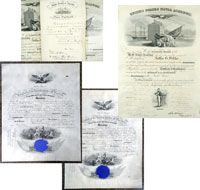 |
Archive of Arthur H. Fletcher, Lieutenant, United States Navy. Arthur H. Fletcher (1844-1912) was born in England. He entered the U.S. Naval Academy in 1861, served through the Civil War on the Macedonian, and during the Spanish-American War was on the general court martial at Norfolk, Va. He served on the USS Rhode Island, the USS Iroquois, the USS Idaho, ordnance duty at Washington Navy Yard, as Commanding Officer, USS Relief, with USS Intrepid, USS Kansas, with Asiatic Station, and with USS Huron. He retired Oct. 11, 1881. He is buried in Arlington National Cemetery.
The archive includes three presidential commissions, three other official, signed documents, and some miscellaneous personal documents.
- Diploma from the U.S. Naval Academy, Nov. 24, 1864, signed by Commodore G. S. Blake as Superintendent of the Academy, vellum, 21½ x 15¾ in.;
- Certificate of Graduation from the U.S. Naval Academy, Oct. 25, 1865, signed by Rear Admiral David D. Porter as Superintendent of the Academy, vellum, 21½ x 15¾ in.;
- Document Signed by Gideon Welles as Secretary of the Navy, promoting Fletcher to Ensign on the U.S. Steamer Rhode Island, North Atlantic Squadron, Dec. 1, 1866, 15 x 9½ in.;
- Commission with stamped signatures of Adrew Johnson as President and Gideon Welles as Secretary of the Navy, appointing Fletcher Ensign in the Navy, vellum, Dec. 20, 1866, 19½ x 15¾ in.;
- Commission with original signatures of Andrew Johnson as President and Gideon Welles as Secretary of the Navy, appointing Fletcher Master in the Navy, vellum (one tear at top right), Mar. 12, 1868, 19½ x 15¾ in.;
- Commission signed by U.S. Grant as President and A.E. Borie as Secretary of the Navy, vellum, promoting Fletcher to Lieutenant in the Navy, vellum, Mar. 26, 1869, 20 x 15¾ in.
- Miscellaneous documents include an 1898 letter from Arthur to his father; a "Summary of Orders" (a military history of his posts); his marriage certificate to Julia Wadsworth (1872); a sympathy letter to Mrs. Fletcher upon his death; and a brief, typed history of A. Fletcher, prepared later by someone in the family.
The document signed by Welles alone (1866) is in very good condition; exccept for some folded teeth on seals, the other documents are overall fine.
Estimated Value $2,500 - 3,000.
Ex Arthur H. Fletcher's granddaughter.
View details and enlarged photo
| Unsold |
Lot 59 |
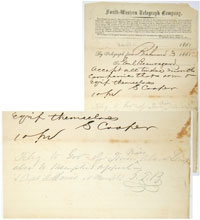 |
Beauregard, Pierre G.T. Beauregard (1818-1893) Confederate general who directed the first action of the Civil War: the bombardment of Ft. Sumter. He was second in command at First Bull Run and at Shiloh, assuming command when Johnston was killed. War-date Autograph Note Signed "G.T.B.," in pencil at the bottom of a South-Western Telegraph Co. telegram sent to Beauregard from Richmond by Samuel Cooper, the highest-ranking Confeerrate general at the time, Mar. 3, 1862. Cooper orders: "Accept all twelve months companies that arm & equip themselves." Beauregard pencils his order below Cooper's: "Teleg. To Govrs. Of Tenn, Miss, Ala, & Louisa & Capt Adams at Memphis…." He signs with his initials and adds a bold paraph. Very good; overall toning, archival tape repairs to two folds on verso, some foxing at right edge and minor edge chips.
Estimated Value $1,000 - 1,200.
View details and enlarged photo
| Unsold |
Lot 60 |
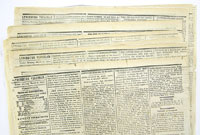 |
[Civil War] Lynchburg Virginian Newspaper Archive. Collection of seven copies of the Lynchburg Virginian from 1864: March 11, 14, 15, 17, 21, 23 and 25, 17 x 11¼ in. Filled with fantastic war news including: Yankee lamentations over their defeat in Florida, seizure of the Confeerate privateer Tuscaloosa, the capture of a blockade runner and presents for President Davis, Negro soldiers at the Libby [prison], war on southern churches, Lincoln's last call, official statement of battle losses before Richmond, Gen. Hood in the saddle, and President Davis among the returned prisoners. Some toning, foxing, and edge chips. A unique collection offered at auction for the first time.
Estimated Value $300 - 500.
View details and enlarged photo
| Unsold |
Lot 61 |
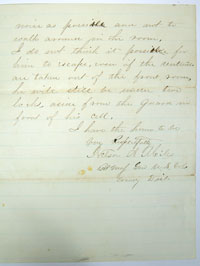 |
[Davis, Jefferson] (1808-1889) President of the Confederate States of America. Pierce's Secretary of War and a Mississippi Senator. After the war, he was captured and imprisoned for two years. Never tried for treason, he was released and wrote The Rise and Fall of the Confederate Government. Letter Signed "Nelson A. Miles" as "Bvt Maj Gen U.S. Vols / Comdg Dist.," two conjoined pages, 9¾ x 7¾ in., Head Quarters Military District, Fort Monroe, August 22, 1865. To an unnamed General, undoubtedly Assistant Adjutant General Edward D. Townsend, to whom Miles sent all his reports about the prisoners and mail to be forwarded. Ink stain at top right of first page. Expertly strengthened on verso at folds. Fine condition.
In full, "I have the honor to state that the prisoner �Davis� is feeling quite comfortable this morning, complaining a little however of erysipelas in the face and a carbuncle on his leg. I also enclose a communication from [Clement] Clay to the �Sec of War� together with a letter to his wife which he desires, forwarded. In regard to the Sentinels, when they were taken out of his room he said they did not disturb or waken him, lately they have been required to make as little noise as possible and not to walk around in the room. I do not think it possible for him to escape, even if the sentinels are taken out of the front room, he will still be under two locks, aside from the Guard in front of his cell."
On May 19, 1865, the propeller vessel "William P. Clyde" arrived at Hampton Roads, Virginia, with Confederate prisoners aboard, including Jefferson Davis and Confederate Senator and diplomatic agent Clement Claiborne Clay. On May 22nd, Major General Nelson A. Miles arrived to take command of Fort Monroe.
From "Prison Life of Jefferson Davis" by Bvt. Lt. Col. John J. Craven, M.D., "Late Surgeon U.S. Vols., and Physician of the Prisoner during his Confinement in Fortress Monroe, from May 25, 1865, up to December 25, 1865" (New York: G.W. Dillingham Co., 1866): "The procession into the fort was simple though momentous … First came Major-General Miles holding the arm of Mr. Davis, who was dressed in a suit of plain Confederate grey, with a grey slouched hat--always thin, and now looking much wasted and very haggard. Immediately after these came Colonel Prichard [Michigan Cavalry] accompanying Mr. Clay, with a guard of soldiers in their rear … Mr. Davis was shown into casemate No. 2 and Clay into No. 4, guards of soldiers being stationed in the cells numbered 1, 3, and 5, upon each side of them. They entered; the heavy doors clanged behind them, and in that clang was rung the final knell of the terrible, but now extinct, rebellion …".
Estimated Value $2,500 - 3,500.
View details and enlarged photo
| Unsold |
Lot 62 |
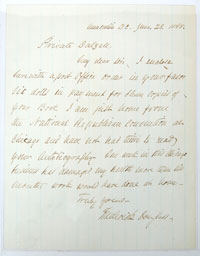 |
Douglass, Frederick (1818-1895) Abolitionist, author, editor and orator, Douglass was an escaped slave who held various political offices including United States minister to Haiti. He was a close friend of Lincoln and wrote an autobiography. Autograph Letter Signed "Frederick Douglass," one page, 8 x 6 in., Anacostia, D.C., June 28, 1888. To "Private Dalzell." In full, "I enclose herewith a Post Office order in your favor six dolls in payment for Eleven copies of your Book. I am just home from the National Republican Convention at Chicago and have not had time to read your Autobiography. One week in this Chicago business has damaged my health more than six months work would have done at home. Truly yours…." On a sheet of blue-lined paper, penned in brown ink perpendicular to the lines. From 1877 until his death in 1895, Douglass lived in a brick house in the Anacostia area of Washington, D.C. which he named Cedar Hill. In 1988, his home at 1411 W Street, S.E., was designated the Frederick Douglass National Historic Site.
On June 19, 1888, the first day of the National Republican Convention, Douglass addressed the Convention after being introduced by General John C. Fremont, who had been the first Republican presidential nominee (1856). One of Kentucky�s 26 delegates cast his vote for Douglass, the first time a Black American received a vote for President at a major political party convention. It was done as a singular honor for Douglass; he received no votes on the remaining ballots. Benjamin Harrison was elected President on November 6, 1888, and on June 26, 1889, he appointed Frederick Douglass as "U.S. Chargé d'Affaires to Santo Domingo and Minister Resident/Consul General to Haiti, residing at Port-au-Prince, Haiti.".
Estimated Value $6,500 - 7,500.
View details and enlarged photo
| Unsold |
Lot 63 |
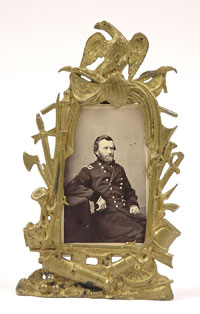 |
Grant CDV by Brady. Housed in a beautiful brass-plated frame from the period, 7¼ x 4 in., adorned with the American Eagle and various battlefield items including cannons, drum, bugle, musket, and saber. CDV has minor specks of foxing, else fine.
Estimated Value $400 - 500.
View details and enlarged photo
| Realized
$353 |
Lot 64 |
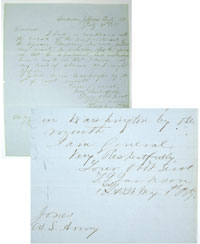 |
Jackson, Thomas J. "Stonewall" (1824-1863) Lee's right arm; he played a major role in early Confederate victories. A graduate of the famous 1846 class of West Point, he taught at Virginia Military Institute. He was given the name "Stonewall" at 1st Manassas for holding his position. He saved the day for Lee at Chancellorsville but was accidentally shot by his own men, lost an arm, and died of complications from pneumonia. His death was a severe blow to the Confederacy. Autograph Letter Signed "T.J. Jackson," as Brevet Major, on pale blue paper, one page, 9¾ x 7¾ in., Henderson, Jefferson County, N.Y., July 31, 1855. While on vacation in upstate New York, Jackson writes to Brevet Major General R. Jones: "I have in compliance with the wish of the Superintendent of the Virginia Military Institute postponed my visit to Europe. As he informed me that the Department, had authorised him to say to me, that I could use my leave of absence as I might prefer. I shall be in Washington by the 10th of next month."
Jackson was able to make the postponed trip to Europe during the following summer and fall. A great admirer of Napoleon's military tactics, he visited sites such as Waterloo while there. Jackson was Professor of Artillery Tactics and Natural Philosophy at VMI from 1851 until the outbreak of the Civil War, when he entered Confederate service. He became Brigadier General on June 17, 1861 and Major General on October 7, 1861. Very fine. Jackson is rare in any form of autograph material and this is a choice, one-page letter.
Estimated Value $9,000 - 10,000.
View details and enlarged photo
| Realized
$7,670 |
Lot 65 |
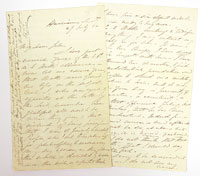 |
Kearny, Phillip (1815-1862) Union general killed when he inadvertently rode into enemy lines at Chantilly. War-date Autograph Letter Signed "Phill.," 4pp (2 sides on one folded sheet), 8 x 5 in. Harrison's Landing (Va.), July 29, 1862. To "My dear John," sharing his feelings about a mutual acquaintance named Watts. Signed vertically along the left margin of the first page, due to lack of space on the last page. The two halves of the folded sheet are separated; otherwise, very fine. This letter was written about a month before Kearny's death.
Estimated Value $2,500 - 3,000.
View details and enlarged photo
| Unsold |
Lot 66 |
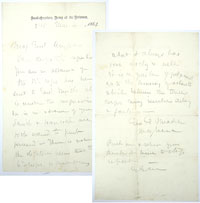 |
Meade, George Gordon (1815-1872) Commander of the Army of the Potomac from before Gettysburg to the end of the war. Important war-date Autograph Document Signed twice, once as "Geo. G. Meade" and once "GGM," 2 pp (recto/verso of one sheet), in pencil, on Head-Quarters, Army of the Potomac letterhead, 8 x 5 in., 8:15, June 4, 1864. Meade sends battlefield orders to Major General (Horatio) Wright.
In full: "Your dispatch reporting you are in advance of the 18th Corps has been sent to Gen. [William 'Baldy'] Smith who is under the impression he is in advance of you. Smith and [Major General Winfield] Hancock are both ordered to push forward. There is not the slightest idea that the 6th Corps is not doing what it always has done orderly and well. It is a question of judgment as to the timing of assaults which between the three corps may involve delay and failure. Geo. G. Meade Maj. Genl." He adds below, "Push on & when you think it time to stop report. GGM." Light occasional soiling, especially to fold on verso, else near fine.
This order was written on the morning after the second assault ordered by General Grant, with the intent of a decisive blow against Lee's entrenched forces; instead, it resulted in the decimation of Union troops by the Confederates, exacting the most horrific carnage of the Civil War, with 7,000 Union casualties in the space of a half hour adding to the already costly assaults on the two previous days. Wright, Smith, and Hancock had all complained to Meade that the other corps commanders had failed to protect them from enfilading fire. Boatner says, "The three corps had moved upon diverging lines, each directly facing the enemy in its immediate front, and the farther each had advanced the more its flank had become exposed….Cold Harbor represents a horrible failure of Federal generalship." Meade's indecisive orders to Wright exemplify that failure of leadership. Skirmishing continued from June 4-12 but Grant did not call a truce to collect the wounded and dying until June 7th, an admission of defeat. In his memoirs, he regrets the last assault on Cold Harbor. With the Confederate victory at Cold Harbor-- Lee's last major field victory--Grant abandoned his move toward Richmond and moved toward Petersburg, where after nine months of trench warfare, Lee would be forced to retreat and would surrender the Army of Northern Virginia at Appomattox Court House on April 9, 1865.
Estimated Value $5,000 - 10,000.
View details and enlarged photo
| Unsold |
Lot 67 |
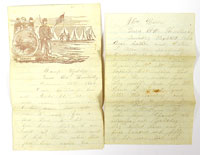 |
Two Letters From A Union Soldier. Two letters by George Washington Eckman (14th Regiment, Indiana Volunteers, Co.B), one on patriotic letterhead, written Jan. 21 and Feb. 13, 1862 from Camp Wyckliffe, Larue County, Kentucky, to his brother, William and Mary Fredrich. Dated Jan. 21 and Feb. 13, 1862, in pencil, light but legible. The Jan. 21 letter recounts the death of Confederate general Feliz Zollicoffer at the Battle of Fishing Creek: "…the ohio boys cleaned old zolacoffer out yesterday. they killed him and four hundred and fifty of his men took all of his arms Several peaces of cannons a lot of prisners he had 16 thousand or more of men…." He also describes camp life, which he enjoys,and adds, ".I was a high private in the rear rank but now I am a corporal. I have to put the gards on."
Estimated Value $200 - 300.
View details and enlarged photo
| Realized
$147 |
|
|